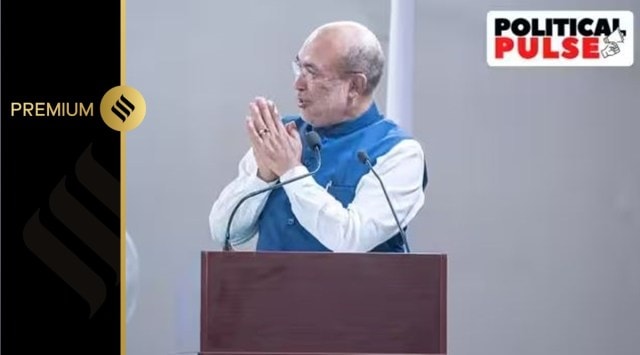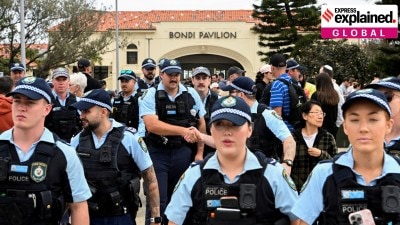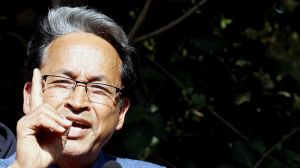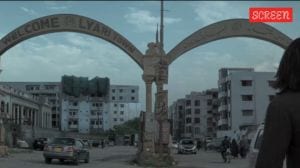Manipur Chief Minister N Biren Singh spent Friday morning inaugurating a driving institute in Imphal (East), and attending the ground-breaking ceremonies of a water body and a sewage plant in Imphal (West). Later in the day, he sat down with Ritika Chopra, Chief of National Bureau (Government), at his Imphal office for an exclusive interview. Over the next 80 minutes, he claimed that he hadn’t lost the trust of the Kukis, and accused “illegal immigrants” threatened by his “war on drugs” for exploiting “vulnerabilities” of the Meiteis to fuel unrest.
Into his second term as CM, Singh says it was to avoid any perception of bias that the Centre may have appointed a security advisor, a new Director General, and others to control the situation.

Excerpts:
It’s been five months since the violence broke out. What are your plans for reconciliation and peace?
My top priority is initiating dialogue with all the affected communities, including the Meiteis and Kukis. I have already started (conversations) through some (informal) channels… We have started the process of resettling displaced individuals and constructing prefabricated houses in both hill and valley regions. Plans are in place to rebuild damaged houses. Fortunately, in the past month, we have witnessed a decrease in hostilities. The recent video involving two missing students stirred emotions, but swift action has helped ease tensions.
Has the dialogue process started too late?
The dialogue process was initiated three months ago. We formed a (peace) committee composed of legislators, led by Hill Area Committee Chairman and MLA Dipu Gangmei. This committee started working three months back, but internally and quietly, because the situation was not conducive at the time.
What is the one thing keeping you up at night?
I want my people to feel confident and secure again. Right now they feel unsafe… I appreciate my leaders in Delhi for treating Manipur’s issue as a national issue. And I am conveying that to the people.
Story continues below this ad
My goal is to restore normalcy in Manipur. Over the last six years, we have made significant progress in terms of tourism and the economy. We even hosted the Miss India pageant (shortly before the recent violence). Many businessmen started investing, and we had no disruptions like strikes, blockades, or killings, prevalent earlier.
Given Manipur’s history of ethnic conflicts, how is the current situation different?
The current situation isn’t a dispute between two communities. It is very clear from the report of the NIA, the highest investigative agency of our country, that there is a hand of external forces. The present crisis should have settled if it wasn’t for their meddling.
See, this fight is actually between the government and the drug mafia. The government’s actions were not directed at the original Kukis or ordinary citizens; our focus was on identifying and addressing illegal immigrants involved in poppy cultivation and drug smuggling. The drug mafia’s true target was the government, but they couldn’t succeed. Instead, they exploited the vulnerabilities of sections, such as the Meiteis in peripheral areas, to create unrest.
But the High Court’s order on ST status for the Meiteis clearly triggered the violence.
Story continues below this ad
That is the point that I’d like to clarify. What people might not be aware of is that the High Court simply asked the government for its opinion; it did not instruct us to take any immediate action. We had the option… which could have been a ‘yes’ or ‘no’. We had not submitted our opinion… So how can it be the point of the unrest? (The single-bench order of the Manipur High Court is currently being heard before a division bench. Additionally, a review petition is pending before the judge who passed the order.)
So what do you see as the trigger for the May 3 violence?
Manipur faces severe drug-related challenges, with 1.5 lakh drug users among a population of just three million (30 lakh). Around 90% of our state is hilly terrain, with 60% of the forests in hills being destroyed for poppy cultivation… We have even found drug factories in the hills and the valley. During my first term, I initiated a war on drugs, leading to the arrest of drug lords, curbing of forest destruction, and action against village chiefs and drug smugglers. In 2022, we secured a majority, resumed our efforts…
We realised that most of the drugs and poppy cultivation was linked to the Golden Triangle region of Myanmar, Thailand, and Laos… While original Kukis and Naga (inhabitants of the state) are innocent… the outsiders involved in this trade had to go.
Story continues below this ad
Over the last 15 years, 926 new villages emerged, primarily in Kuki-dominated areas like Churachandpur, Chandel and Kangpokpi… There was no such increase in the Naga-dominated and Meitei-Pangal dominated areas. This raised questions… With the guidance of Honorable Home Minister Amit Shahji, we formed a committee to identify and assess illegal immigrants from Myanmar… led by Cabinet Minister Letpao Haokip, who is a Kuki friend. It also had one Naga Minister, Awangbow Newmai, and one from the Meitei community (Thounaojam Basanta Singh). In a week, the committee identified 2,480 illegal immigrants, who are now in detention centres. We also warned people against sheltering illegal immigrants. I feel these events led to the current crisis.
Did the state machinery fail to anticipate the violence that broke out in May?
No, I could smell something (was wrong). On April 27, I was supposed to inaugurate an open gym, but it was burned by miscreants. Right from that day, I had doubts… and I asked the DGP to take care. When I was informed about the (tribal solidarity) rally (of May 3), I inquired about its purpose, and I was told it had to do with the High Court order. I was surprised since the state government had not recommended anything. At that time, the Hill Areas Committee members, all 20 MLAs, met me. They requested that I not recommend anything. I assured that we could even ask for more time from the court.
Why could the state machinery not control the violence then?
Story continues below this ad
That was a surprise (to me). Throughout the day, Governor Madam (Anusuiya Uike) and I were with the Vice-President (Jagdeep Dhankhar), who was visiting. I didn’t know what happened or didn’t. I don’t want to criticise… but for the day of the rally, I had requested security for all vulnerable districts. I later found out that the DGP did not provide adequate security in the Churachandpur district. He provided security in Kangpokpi and Noney districts. In Noney, the Kuki community is not even present. This will come out in the investigation. I don’t want to say more. (The Ministry of Home Affairs has set up a three-member commission headed by retired judge Ajai Lamba to probe the ethnic strife.)
You speak of illegal immigrants… Are they in such numbers that they can threaten to destabilise the state?
That is the biggest challenge. It represents the biggest failure of previous governments. Our 398-km border with Myanmar is unguarded, whereas our borders with Bangladesh, Nepal and Pakistan are fenced… Furthermore, we have implemented a Free Movement Regime (allowing tribes living along the border on either side to travel up to 16 km inside the other country without a visa). How will indigenous people survive? More than three to four lakh (illegal immigrants) have entered.
Are these official figures?
No, but I have data to show how these new villages are coming up annually. Our border is not guarded. Assam Rifles is there but within 12 km of our border with Myanmar. It’s only after the BJP came to power that we started fencing 10 km of our border with Myanmar. We now have approval for another 80 km.
Story continues below this ad
But the Free Movement Regime was significant for cross-border people-to-people relationships, and also for livelihoods.
The Free Movement Regime should not have happened. Those individuals belong to another country… Who will keep track if they have gone back or settled here? Who will send them back?… Perhaps they could hold cards that they surrender upon entering and collect when they go back. There is currently no such system.
Isn’t the appointment of IPS Rajiv Singh and former CRPF chief Kuldiep Singh, along with the extended visits of Central ministers, a sign of the Centre’s loss of confidence in the state government?
No, that is not an accurate perception. The Central government has full confidence in both the state government and me. However, the situation is viewed as a conflict between two communities, and I belong to one of those communities. If I continue and I hold the same powers… then it may be seen as an imbalance. To avoid any perception of imbalance, the Centre may have appointed a security advisor, a new DG, and others… If the Centre did not trust me, then they always have other options.
Story continues below this ad
If the Centre trusts you, should the CM not have control over the Unified Command?
That’s exactly what I’ve clarified. As a Meitei, if I were to hold the (unified) command, it could be perceived as an imbalance. There’s no bias in my heart or in my work, nor in the Centre’s thinking, but people might still misinterpret it… That’s how the Honorable Union Home Minister is dealing (with our issues)… ‘Balance dikhana hai .. Meiteis our Kukis ko same tarah se deal karna hai (We should show balance in our dealings with the Meiteis and Kukis)’. That’s the kind of message I feel the Centre is trying to convey.
You are often compared to your counterpart in Mizoram, and seen as acting on behalf of the Centre rather than asserting your state’s autonomy…
I’m a karyakarta (worker) of a national party… When the party’s leadership makes a decision after careful consideration… it is my duty to obey… I have received so much condemnation, but I bear it because we can’t spell out everything to the public… Pehli baar hum gaali khaya hai, hum maanta hai (I acknowledge that for the first time, I have been criticised a lot). I am aware of the good intentions of the Centre… Slowly, people are also realising this.
Story continues below this ad
You said in the past that you would resign if asked to by the Central leadership. What is the message you have received from the Prime Minister and Home Minister?
For the last three to four months… morning, night, 12 o’clock, 1 o’clock… I have been constantly in touch with the Griha Mantriji (Home Minister). Ek mere ko confidence diya hai Griha Mantriji ne, ki himmat nahin harna aur himmat se ladna (The Home Minister has given me the confidence to never give up and continue fighting with courage). These words have helped me feel reborn again. Sometimes I was so frustrated, but Griha Mantriji always reassured me. The Honorable PM always tells me, khyal rakhna, sabka khyal rakhna, achchi tarah se shanti jaldi laane ka koshish karo (Take care of everyone and try to bring peace back as soon as possible).
Recently, a mob tried to storm your residence. Do you think you still enjoy the support of your constituents?
In Manipur, there are many reputable civil society organisations… that represent different communities… none of these were involved (in the incident). A newly formed group was behind it. Also, let me remind you that the mob couldn’t even get near my house because my constituents didn’t allow them. Moreover, most of the youths arrested that night belong to areas dominated by the Opposition… Those who lost the elections are playing dirty games.
In an earlier interview to The Indian Express, you claimed improved relationship between security forces and the public, along with decreased concerns about AFSPA. Have these gains been eroded?
We have more insurgent groups engaged in talks… the Home Minister has already initiated this process. Some insurgents are in discussions, and we expect resolutions soon. Additionally, more groups are transitioning to mainstream dialogue. Regarding the relationship between security forces and the public, there is some emotional anger, but now people are becoming aware of the real instigators behind this violence.
What was your reaction to the video of two tribal women being paraded naked?
I was really shocked… However, I must commend the people of Manipur for their response. The two women, whose uncle and nephew were tragically killed, were ultimately rescued by members of the same community to which the culprits belonged. While I condemn the actions of the eight individuals involved in this unlawful act, I also appreciate those who stepped in to save the victims… helped them get dressed, and sent them back home. Following the incident, it was not the police that raided the culprits’ homes, but the Meitei community that mobilised and handed over the culprits to the authorities. Some of their houses were also burned down. This event is deeply unsettling for all right-thinking individuals.
You haven’t met with the families of the victims. Why are there no such healing overtures on your part?
I wanted to go and console the Kuki families, but… the situation was tense, and I felt that I was being targeted and blamed by the Kukis. I’m not sure why, and I believe that ultimately it’s up to God to determine who was right and wrong. However, because I didn’t visit the Kuki families, I also refrained from visiting the families of the Meitei victims. I was concerned that people might perceive it as a biased gesture…ki dekho Meitei hai isiliye Meitei ke pass jaa raha hai (See, he’s visiting Meiteis cause he’s a Meitei himself)… I am facing this dilemma, which is the most challenging part for me. But I have visited relief camps of both the communities.
How would you address the concerns of the Kukis regarding your government?
You can see this in my working style. I had a principal secretary till recently, Vumlunmang Vualnam, who is a Kuki one of my closest associates. I have a person in my team from the same community, Christopher Doungel, who continues to work with me. He (Doungel) is part of all our andar ka (internal) talks. My government recognised the ‘Kuki Rising Day’ to commemorate their fight with the British and I made it a gazetted holiday. I also recognised the Hun Festival and announced a holiday for it… That’s why I am saying that all Manipuri Kukis love me and trust me. It’s the outsiders who are threatened by my actions and are worried that they will be identified through biometric and sent back. They are ones creating a rift.

































